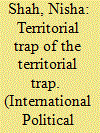| Srl | Item |
| 1 |
ID:
175117


|
|
|
|
|
| Summary/Abstract |
Under the banner of martial empiricism, we advance a distinctive set of theoretical and methodological commitments for the study of war. Previous efforts to wrestle with this most recalcitrant of phenomena have sought to ground research upon primary definitions or foundational ontologies of war. By contrast, we propose to embrace war’s incessant becoming, making its creativity, mutability and polyvalence central to our enquiry. Leaving behind the interminable quest for its essence, we embrace war as mystery. We draw on a tradition of radical empiricism to devise a conceptual and contextual mode of enquiry that can follow the processes and operations of war wherever they lead us. Moving beyond the instrumental appropriations of strategic thought and the normative strictures typical of critical approaches, martial empiricism calls for an unbounded investigation into the emergent and generative character of war. Framing the accompanying special issue, we outline three domains around which to orient future research: mobilization, design and encounter. Martial empiricism is no idle exercise in philosophical speculation. It holds the promise of a research agenda apposite to the task of fully contending with the momentous possibilities and dangers of war in our time.
|
|
|
|
|
|
|
|
|
|
|
|
|
|
|
|
| 2 |
ID:
101481


|
|
|
|
|
| Publication |
2010.
|
| Summary/Abstract |
Buzan & Hansen (2009) point to the role of historical claims in constituting disciplinary identities. Examining their intellectual history, this article evaluates how their use of an evolution metaphor establishes 'history' and how this history makes 'security' and 'security studies' intelligible. The article demonstrates that although Buzan & Hansen establish International Security Studies as being comprised of diverse theoretical approaches, they do so with a model of history that sanctions a realist conception of security. More broadly, Buzan & Hansen compel an exploration of the tensions between history and genealogy in security studies.
|
|
|
|
|
|
|
|
|
|
|
|
|
|
|
|
| 3 |
ID:
111928


|
|
|
|
|
| Publication |
2012.
|
| Summary/Abstract |
This paper argues that attempts by theories of globalization to overcome the "territorial trap" have failed. Describing how the modern state emerged with two interrelated territories-a political concept about bounded jurisdiction and public good that over time is effaced but reinforced as territory is defined as brute, physical terrain-it shows that the assumption in globalization theories that territory is the state's physical area entrenches the normative defense of the territorial state as the framework of political order. The consequence is that overcoming the territorial trap not only requires uncovering how and why territory becomes an assumed political ideal, but also how and why this trap produces the subsequent trap of understanding territory primarily as the "physical substratum" of the sovereign state. Globalization theories' analysis of political transformation must therefore focus not only on the "permeability" of territorial borders, but whether and how evolving notions of global space might be providing a different political theory. A preliminary discussion of efforts to uncover how an alternative global spatial principle is reassembling political authority suggests a possible means of escape and way forward.
|
|
|
|
|
|
|
|
|
|
|
|
|
|
|
|